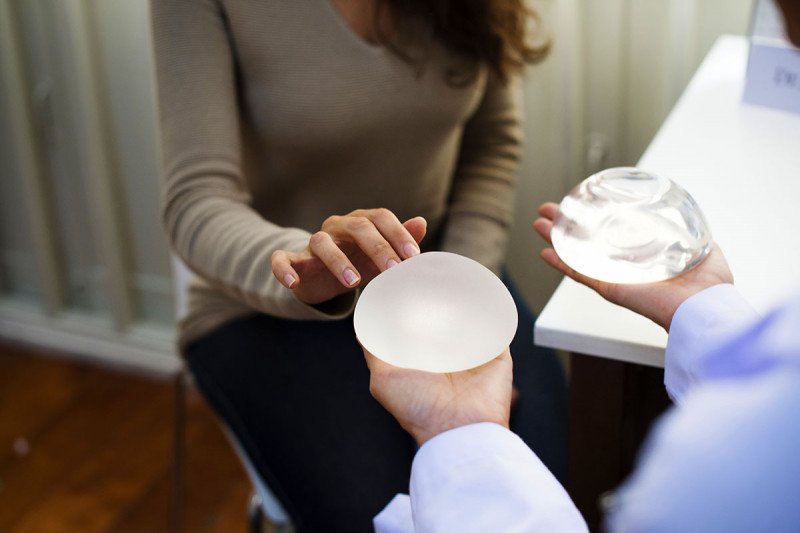
The U.S. Food and Drug Administration (FDA) reported on September 8 that a small number of cases of squamous cell carcinoma (SCC) had been found in the scar tissue of women with breast implants. The FDA is aware of fewer than 20 of these cases of SCC. While the finding appears rare among the millions of women with implants, any new change in or around a breast implant — such as swelling, pain, a new lump, or a new rash — should be evaluated by a doctor.
Based on the data available about these cases, it seems that SCC developed in women with saline and silicone, as well as smooth and textured, implants. This is a rare event. In a typical year, according to the American Society of Plastic Surgeons, approximately 400,000 women receive breast implants in the United States alone — whether it be for breast reconstructive surgery or cosmetic breast augmentation.
This report follows an FDA announcement in October 2021 about new safety requirements for breast implants. The agency placed a “black box” warning on all breast implants to inform patients of the potential risks, including Breast Implant-Associated Anaplastic Large Cell Lymphoma (BIA-ALCL), and other symptoms that some patients with breast implants have experienced, including fatigue, joint pain, tiredness, brain fog, and memory loss.
The FDA safety rules also mandate that manufacturers sell the breast implants only to health providers who review a Patient Decision Checklist of potential risks with patients before surgery.

It’s important to note that these risks apply to some — but not all — breast cancer patients. We realize patients may have questions and concerns about the new findings and guidance.
We spoke with Memorial Sloan Kettering Cancer Center surgeons Babak Mehrara, Chief, Plastic and Reconstructive Surgical Service, and Colleen McCarthy, reconstructive surgeon, about what patients should know going forward.
What is the goal of the FDA regulations regarding breast implants?
The latest FDA guidance aims to empower people with more facts regarding breast implant surgery. These FDA regulations are not based on further studies; instead, they respond to concerns that some patients planning to proceed with breast augmentation or breast reconstruction with implants did not have all the facts.
Patients should know that the goal is to help them make decisions that fit their health preferences and values. A more complete understanding of the risks and benefits of a surgical procedure can result in better-informed choices regarding breast reconstruction surgery.
How will these rules likely impact patients?
Women considering breast reconstructive surgery using implants at MSK are routinely informed of the risks and the benefits of breast implants. Our patients are also presented with the other options — reconstruction with their own tissues or external prosthesis, for example — that may be suitable. At MSK, we take pride in providing individualized treatment plans for each patient. Our doctors and nurses clearly explain the pros and cons of each procedure, empowering our patients to make the best possible choices for themselves.
Which patients should not receive breast implants, according to the FDA safety recommendations?
The FDA has advised against implant use in patients who:
- Have an active infection anywhere in the body;
- Have existing cancer or precancer of the breast tissue that has not been adequately treated;
- Are pregnant or nursing.
What do patients who have been treated for breast cancer need to know about breast implants?

Every surgical procedure, including breast implant reconstruction, carries some risk, such as bleeding or infection. Breast implants may also lead to excessive scar formation resulting in hardening of the breast; a change in the position of the implant; or, in some cases, pain. Like any other artificial device, breast implants may fail or leak and may require replacement surgery.
There is a large body of evidence that supports the safety of breast implant reconstructive surgery. Breast implants do not delay the detection of recurrent disease.
In a 2019 public hearing, some women stated they had muscle aches, chronic fatigue, and joint pain after receiving their breast implants. The FDA is actively investigating these concerns.
How common are cases of patients developing lymphoma from breast implants?
Breast implants can have a smooth or rough-textured shell. Textured breast implants are associated with BIA-ALCL, a cancer of the immune system. The FDA has quantified the risk from 1 in 3,000 patients to up to 1 in 30,000 patients. The risk of this lymphoma likely depends on the specific manufacturer of a textured implant and, in some cases, may be lower than these estimates.
It’s important to know that so far there are no confirmed cases of BIA-ALCL worldwide in individuals who have only ever had smooth breast implants.
Are textured breast implants still on the market?
In 2019, the FDA issued a recall of Allergan textured breast implants. Textured implants or expanders from other manufacturers were not included in this recall.
When should a patient be concerned about lymphoma or other diseases from breast implants?
The FDA has stated explicitly that implant removal is not necessary. Having symptoms such as breast swelling, a lump in your breast or armpit, persistent breast pain, a rash, or any change in your implants should be investigated by your physician. It is important to note that these signs and symptoms do not necessarily mean a diagnosis of BIA-ALCL. These changes, for example, can also result from a leaking implant or trauma to the breast area.
What is MSK’s recommendation for the removal of textured breast implants?
There is no scientific evidence that removing a textured device eliminates the risk of BIA-ALCL. However, some women may choose to remove their textured implant with or without the scar around it to minimize the concern regarding this risk.
Neither the FDA, nor the American Society of Plastic Surgeons, nor the American College of Surgeons recommends that women remove their Allergan textured breast implants.
How long can patients safely keep their original breast implants?
There is no guarantee that a woman will have one or both breast implants for life. The best data suggests that approximately 90% of women will have their original implants at 10 years.



